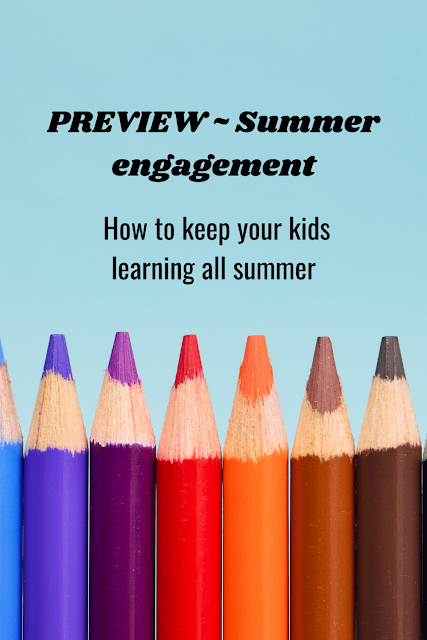Today, we are talking about learning through play!
Given how the last few months of the 2019-2020 school year ended, I firmly believe your kids (and you) deserve to have some time to decompress and just enjoy life instead of trying to force a new method of learning and a new teaching model. But, as I explained earlier in the week, many families and teachers worry about "summer brain drain" or the loss of academic gains due to the lengthy period of time between the end of one school year and the start of the next. You may be worried that your student will have gaps in their education or skills or that they aren't learning enough this summer -- I also noted in our previous posts that your children's teachers are preparing for this. They know that the school year did not end ideally for most families and that many students merely maintained rather than making academic gains. Teachers and schools are already thinking about how to address this as the next school year begins this fall.
So, today, let's get back to focusing on FUN and PLAY!
And, your kids, I promise, are learning as they play. In fact, for younger children, play -- not academics -- is one of the most important things that can happen on any given day. This is supported by quite a bit of research, and if you read our series reviewing the book The Trouble with Boys by Peg Tyre, you'll already be familiar with the fact that pushing academics too soon or under overly stressful situations generally backfires. Even if gains are made in those situations, they even out later in a child's academic career.
So, again -- FUN and PLAY are your prescriptions for this summer!
First, there are a few loose rules to ensure that your kids actually learn through play -- I know, counter-intuitive right? It actually makes a lot of sense.
In order to truly learn from play, children need to:
- be free to engage in activities THEY choose, even if you aren't into it
- find their activity enjoyable
- be allowed to be spontaneous, imaginative, and creative
- be directed by their own internal compass
- risk and judgment free so they can express themselves without worry
In other words, your kids need to be the drivers of their playtime activities and experiences. Your child may absolutely love an activity that you cannot stand. As the adult, it is your job to suck it up and let the kid indulge in the activity anyhow. They need you to be able to sit back and accept the silliest, wackiest, weirdest things they may come up with through creative play and imagination without criticism.
Now, of course, you need to make sure they are safe and not at risk of harm, but otherwise, leave the play session up to your kids.
By freely playing and exploring their toys, found objects (cardboard boxes, empty toilet paper tubes, art supplies, rocks, etc.), your kids intuitively soak up lessons about how the world works. It is upon these intuitive understandings of the world around them that the foundation is built for more structured, formal lessons later in their academic careers.
For many kids, true play is both a physical and mental activity. They move around and change positions. They use gross and fine motor skills. They examine and inquire. They form questions (all those "whys", am I right?). They touch, listen, look at, taste, smell the world around them. Even older kids do this, although older kids have typically developed better gross and fine motor control and better self-regulation so play for older kids generally looks and sounds significantly different than for younger kids.
Be sure that your kids have access to plenty of games, toys, or supplies that are open ended and require your kids to formulate their own ways of interacting with the materials. For example, a large cardboard box affords hours and hours of creativity and play for most kids. So do blocks, Legos, paints or pens or crayons and paper, and so on.
Be sure to check out the rest of our series on summer engagement:
- Preview: Summer engagement -- how to keep your kids learning all summer (Read it HERE)
- Part I: Is summer "brain drain" real and where do we go from here? (Read it HERE)
- Part II: Keep those kids reading this summer (Read it HERE)
- Part III: Bolstering math skills over summer (Read it HERE)






